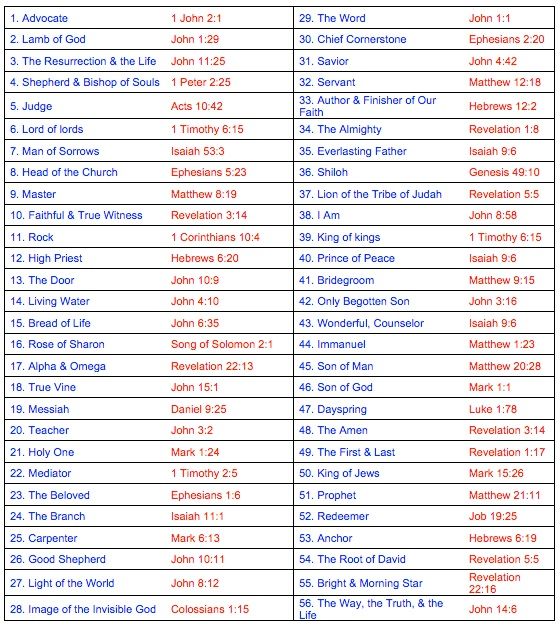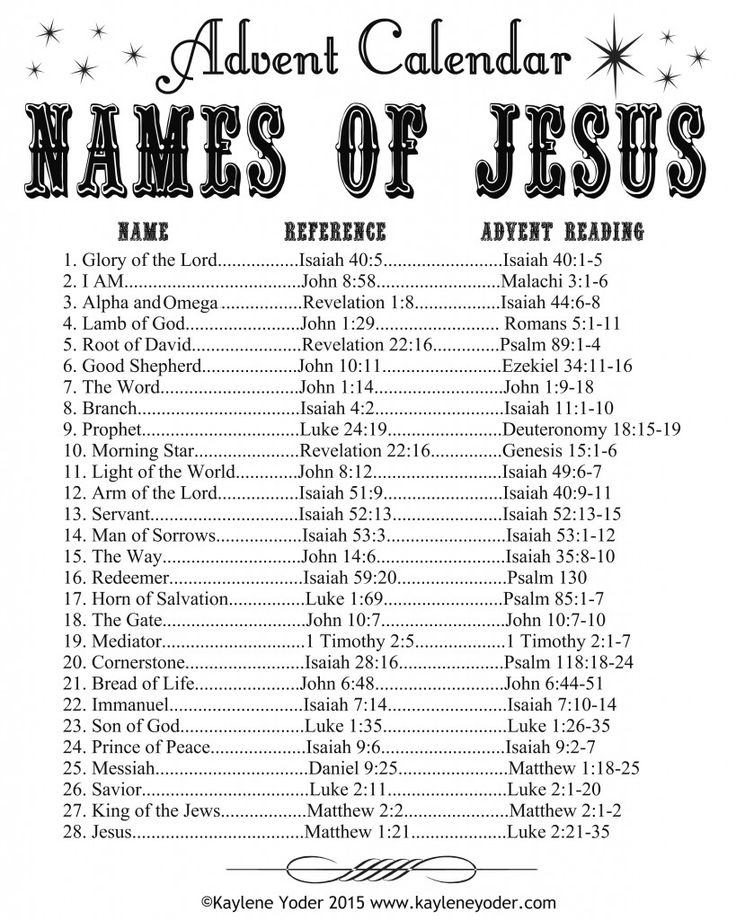Have you ever wondered about the different names of God in the Bible? God is known by many names in the Bible, each reflecting a different aspect of His character and personality. These names are not just random labels, but they reveal something about the nature and character of the Almighty God we worship.
The Names of God and Where They are Found in the Bible
 The Bible is full of different names for God. Some of these names are descriptive, while others are more personal. Let’s take a look at some of the most common names of God in the Bible:
The Bible is full of different names for God. Some of these names are descriptive, while others are more personal. Let’s take a look at some of the most common names of God in the Bible:
- El: This is one of the most ancient names of God, and it means “God” or “mighty one.” It is used more than 200 times in the Old Testament.
- Elohim: This name of God is used more than 2,500 times in the Old Testament. It means “God,” “mighty one,” or “creator.”
- Yahweh: This is arguably the most important name of God in the Bible. It is used more than 6,800 times in the Old Testament. This name is so holy that it is never spoken aloud by Jews. When they encounter it in the Bible, they say “Adonai” instead.
- Adonai: This name of God means “Lord” or “master.” It is used more than 400 times in the Old Testament.
- Jehovah-Jireh: This name of God means “The Lord Will Provide.” It is found in Genesis 22:14, where God provides a ram to sacrifice in place of Isaac.
- Jehovah-Nissi: This name of God means “The Lord is my Banner.” It is found in Exodus 17:15, where God helps the Israelites defeat the Amalekites.
- Jehovah-Shalom: This name of God means “The Lord is Peace.” It is found in Judges 6:24, where God appears to Gideon and assures him of His protection.
- Jehovah-Raah: This name of God means “The Lord is my Shepherd.” It is found in Psalm 23, where David reflects on the care and guidance of God.
- Jehovah-Tsidkenu: This name of God means “The Lord Our Righteousness.” It is found in Jeremiah 23:6, where God promises to send a righteous king to rule over Israel.
- Jehovah-Shammah: This name of God means “The Lord is There.” It is found in Ezekiel 48:35, where God promises to dwell with His people in the new Jerusalem.
Attributes of God
 Each of the names of God in the Bible has a corresponding attribute. These attributes reveal something about the nature of God and how He interacts with His creation. Let’s take a look at some of the key attributes of God:
Each of the names of God in the Bible has a corresponding attribute. These attributes reveal something about the nature of God and how He interacts with His creation. Let’s take a look at some of the key attributes of God:
- Love: God’s love is the driving force behind everything He does. It is an unconditional love that seeks the best for His children.
- Grace: God’s grace is His unmerited favor toward humanity. It is through grace that we are saved and given eternal life.
- Mercy: God’s mercy is His compassion toward those who are suffering or in need. It is through His mercy that we are forgiven and restored.
- Justice: God’s justice is His perfect standard of righteousness. He will ultimately judge all humanity based on this standard.
- Holiness: God’s holiness is His absolute moral purity. He cannot tolerate sin or anything that is opposed to His nature.
- Eternity: God exists outside of time and is eternal. He has always been and will always be.
- Omniscience: God is all-knowing and has perfect knowledge of everything that has ever happened or will happen.
- Omnipotence: God is all-powerful and can do anything that is consistent with His nature and character.
- Omnipresence: God is everywhere at all times. He is not limited by time or space.
Names of Jesus
 In addition to the names of God in the Bible, there are also many names and titles for Jesus. These names reveal His character and work as the Savior of the world. Let’s take a look at some of the most common names of Jesus:
In addition to the names of God in the Bible, there are also many names and titles for Jesus. These names reveal His character and work as the Savior of the world. Let’s take a look at some of the most common names of Jesus:
- Emmanuel: This name of Jesus means “God with us.” It is found in Matthew 1:23, where the angel tells Joseph that Mary will give birth to a son who will be called Emmanuel.
- Christ: This name of Jesus means “Messiah” or “Anointed One.” It is a title that was given to Him because He fulfilled the Old Testament prophecies of a coming Savior.
- Son of God: This is one of the most significant names of Jesus, as it reveals His divine nature and His relationship to the Father.
- Son of Man: This name of Jesus emphasizes His humanity and His role as the representative of all humanity before God.
- Prince of Peace: This name of Jesus appears in Isaiah 9:6 and emphasizes His role as the bringer of peace between God and humanity.
- Lamb of God: This name of Jesus appears in John 1:29 and 36 and emphasizes His sacrificial death on the cross for the sins of the world.
- Alpha and Omega: This name of Jesus appears in Revelation 1:8 and emphasizes His eternal nature and His control over all things.
- Good Shepherd: This name of Jesus appears in John 10:11 and emphasizes His care and protection for His followers.
- Light of the World: This name of Jesus appears in John 8:12 and emphasizes His role as the illuminator of truth and salvation in a dark world.
- King of Kings: This name of Jesus emphasizes His sovereignty and His ultimate authority over all things.
Reading Plan
 If you’re interested in learning more about the names of God in the Bible, there are many resources available to you. One great place to start is with a reading plan that focuses specifically on the names of God. Here’s a simple plan that will take you through some of the most significant names of God:
If you’re interested in learning more about the names of God in the Bible, there are many resources available to you. One great place to start is with a reading plan that focuses specifically on the names of God. Here’s a simple plan that will take you through some of the most significant names of God:
- Day 1: El
- Day 2: Elohim
- Day 3: Yahweh
- Day 4: Adonai
- Day 5: Jehovah-Jireh
- Day 6: Jehovah-Nissi
- Day 7: Jehovah-Shalom
- Day 8: Jehovah-Raah
- Day 9: Jehovah-Tsidkenu
- Day 10: Jehovah-Shammah
- Day 11: Emmanuel
- Day 12: Christ
- Day 13: Son of God
- Day 14: Son of Man
- Day 15: Prince of Peace
By studying these names and the attributes they represent, you’ll gain a deeper understanding of who God is and how He interacts with His creation. You’ll also gain a greater appreciation for the work of Jesus on the cross and the salvation He offers to all who believe.
Chart: Names of God
 If you prefer visual aids, there are many charts and posters available that list the names of God and their corresponding attributes. These can be helpful tools for memorizing and meditating on the different names of God in the Bible. Here’s an example of a chart that lists some of the most significant names of God:
If you prefer visual aids, there are many charts and posters available that list the names of God and their corresponding attributes. These can be helpful tools for memorizing and meditating on the different names of God in the Bible. Here’s an example of a chart that lists some of the most significant names of God:
| Name of God | Meaning | Scripture | Corresponding Attribute |
|---|---|---|---|
| El | God, mighty one | Genesis 33:20 | Creator |
| Elohim | God, mighty one, creator | Genesis 1:1 | Powerful |
| Yahweh | The Lord | Exodus 3:15 | Everlasting |
| Adonai | Lord, master | Genesis 15:2 | Merciful |
| Jehovah-Jireh | The Lord will provide | Genesis 22:14 | Provider |
| Jehovah-Nissi | The Lord is my banner | Exodus 17:15 | Victorious |
| Jehovah-Shalom | The Lord is peace | Judges 6:24 | Peaceful |
| Jehovah-Raah | The Lord is my shepherd | Psalm 23:1 | Caring |
| Jehovah-Tsidkenu | The Lord our righteousness | Jeremiah 23:6 | Righteous |
| Jehovah-Shammah | The Lord is there | Ezekiel 48:35 | Present |
By studying the different names and attributes of God, you’ll gain a deeper understanding of who He is and how He relates to His creation. You’ll also develop a greater appreciation for the work of Jesus on the cross and the salvation He offers to all who believe. Whether you prefer reading plans or charts, there’s a wealth of resources available that can help you explore the names of God and grow in your knowledge and love of Him.